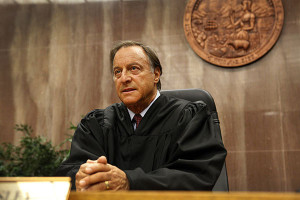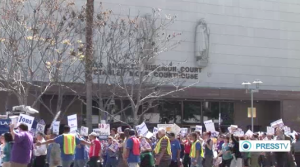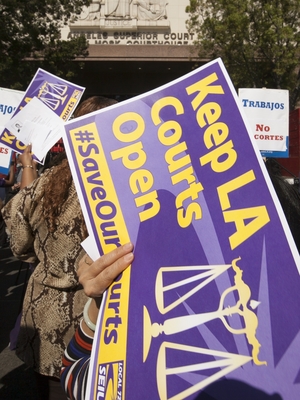San Diego County Documents Part Of Courts Crisis
Iranian TV News Still Covering Court Cuts
You can see the report (it’s in English) here.
‘Hell Week’ Ends With Hundreds Of Friday Firings
Balanced budget? ‘Too little, to late’ for L.A. County court
While the Governor and legislators celebrate their $96.4 billion budget deal, workers at L.A. County court are waiting for their pink slips.
According to an L.A. Times story today: “The Los Angeles County Superior Court plans to eliminate more than 500 jobs by the end of the week in a sweeping cost-cutting plan to close a projected $85-million budget shortfall for the next fiscal year.” The story also includes a breakdown of the layoffs.

Photo credit: Al Seib/L.A. Times as part of the L.A. Times coverage of the L.A. County Court layoff story
As part of his deal with legislators, the governor agreed to restore $63 million to the courts in the budget that will take effect July 1– well short of the $100 million the Legislature wanted.
“We are glad that restoration of trial court funding has begun,” said L.A. County Superior Court presiding judge, David Wesley, in a statement. “But it is a shame that it is too little, too late, to stop the awful reductions in access to justice that state funding cuts have brought.”
Read the full story here.
Lines Being Drawn As Courts Budget Deadline Nears
SDCBA asks San Diego attorneys to write to legislators to protest budget cuts
In response to the nearly 1.2 billion dollars of funding cuts to the California Judicial Branch over the last five years, San Diego County Bar Association President Marcella McLaughlin has called on San Diego attorneys to write to their legislators to prevent further cuts and restore funding to the courts, according to a report by BLAWGSD on May 24, 2013. A copy of the suggested letter is below and can be found online here:
Honorable __________
Member of the California Legislature
State Capitol
Sacramento, CA 95814
Dear Assemblymember/Senator:
As a constituent and an attorney I am gravely concerned about the massive underfunding our judicial system has experienced over the last five years. While I understand our entire state has been reeling from the impact of the recession, our courts have taken a disproportionate share of the budget cuts. The result has been a deconstruction of our justice system impacting access to justice for our citizens.
Courts throughout the state have closed their doors. From Fresno to San Bernardino whole courthouses have been shuttered requiring litigants to travel, in some cases, well over an hour, to pay a simple traffic ticket. More significantly public safety is at great risk as staff layoffs have occurred, hours of service have been reduced and thousands of cases are placed into fewer courts
The time is now to reinvest in courts. Democracy stands in the balance.
Advocates Building Case For Courts Funding Before June Deadlines
The state’s courts advocates have become increasingly vocal ahead of California’s June 15 budget deadline, and a recent commentary in The Record newspaper in Stockton laid out the most passionate argument: That justice is being denied those in poverty who most need access to the courts. In a commentary, two members of the SEIU local 1021 noted that “… justice is more than blind when those seeking it are invisible.”
They list a few of the worst service cuts for Stockton-area citizens: “Small claims cases are no longer heard anywhere in San Joaquin County. You can no longer access court records online for family law, juvenile, guardianship, mental or criminal proceedings.” They are also among organized labor voices statewide starting to increase pressure on the budget process. Read the commentary here.


